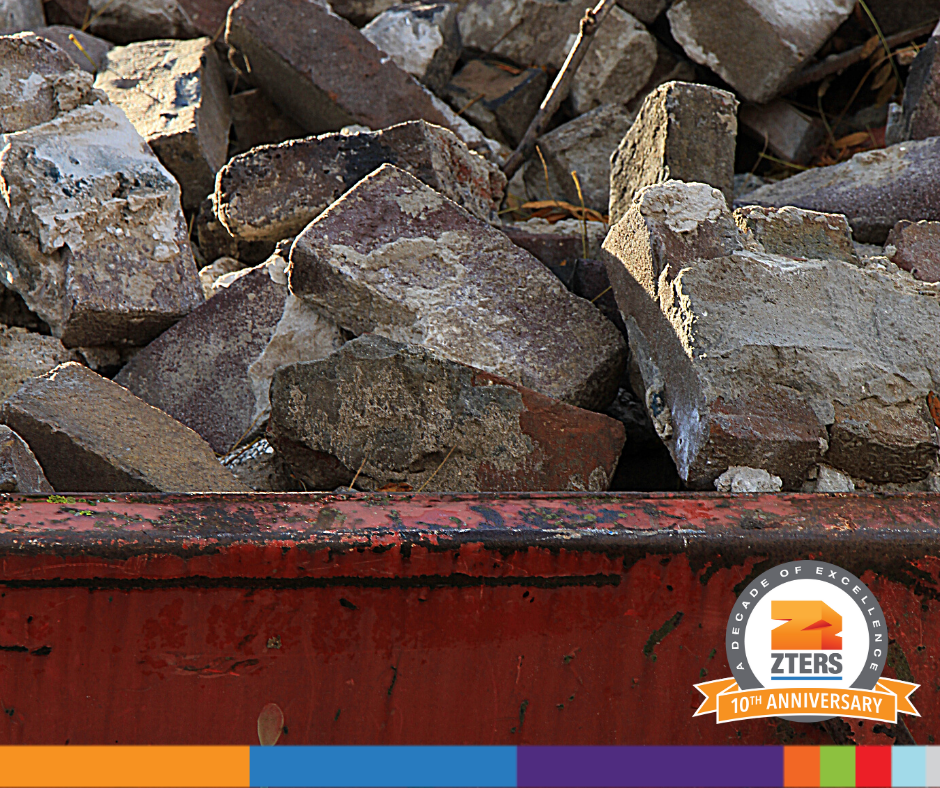Are there things you can’t put in a dumpster? Actually, yes. And there are things you might not think of.
Dumpsters are essential for construction and renovation projects, but not everything can be thrown in a dumpster. If you think you’re going to slide by and dump everything in your roll-off rental, you might be in for a surprise. Throwing away items that don’t belong in a landfill could result in a delayed dumpster pickup, and more than likely some additional fees. The best way to avoid problems is to know exactly what materials can — and can’t — be thrown in a dumpster before you start using it.
So, what materials aren’t allowed in dumpsters?
Rules vary from one municipality to the next, so if you know you may have some questionable items on your worksite, check with your roll-off rental company before you rent the dumpster. You’ll have to arrange for special waste removal if you have things like medical waste or certain building materials, such as wood or debris that may have been contaminated with lead or asbestos. There are some other materials you may not have considered, though. Here’s a list of commonly prohibited materials.
1. Hazardous Materials
Chemicals, cleaning products, corrosive materials and batteries are all examples of hazardous materials that dumpster rental companies won’t allow to be placed in roll-offs. Add to that list any paints, herbicides, pesticides, liquid waste, freon, fuel tanks, and neon light ballasts. Any corrosive or acidic chemicals, and any paint thinner, stains or varnishes will also make the list. If you wouldn’t pour it into the ground, it probably won’t be allowed in a landfill. Read our post on how to dispose of hazardous materials for more on this.
2. Flammable Materials
Flammable liquids like gasoline are probably a no-brainer in this category – you don’t want to cause a landfill fire. But there could be other flammable materials on a jobsite. If you come across containers of chemicals and you aren’t sure whether they’re flammable, look for a flammable hazard symbol on the container. When in doubt, assume the worst and treat unknown liquids or chemicals as potentially flammable or hazardous.
3. Certain Building Materials
As mentioned, some building materials contain hazardous waste (like asbestos) that cannot be placed in dumpsters. Other types of building materials, like concrete and bricks, are usually allowed in your roll-off, but weight limits will apply. Concrete and brick weight adds up, and there may be restrictions on the amount you can throw out in any one pickup. Check with your rental company before you place your order to learn their policies and weight limits. In some cases, you may be able to recycle building materials.
4. Infectious or Medical Waste
Infectious debris and medical waste are not allowed in dumpsters. This includes obvious things like rags or cloths contaminated with body secretions, needles, red bags and sharps. But you might not know medications can also be considered medical waste. Look out for anything associated with medical treatments. This includes medications during bathroom renovations. You don’t want them ending up in a landfill and causing contamination.
These materials are mainly an issue for commercial facility renovations. Construction and renovation companies should communicate with clients before the job starts to determine what kind waste to expect during the project.
Need a Dumpster?
Speak with an account manager for a free quote.
5. Regular Household Garbage
Some roll-off dumpster companies have regulations around regular household waste, including food waste. You may be fined for throwing food and household waste in a roll-off rental, so be aware. If you need to throw away small amounts of food or household waste in the course of your project, just use the regular municipal garbage collection bins. If you think you’ll throw out a lot of food waste, such as a restaurant renovation, talk with your rental company about disposal options.
Why are there waste rules?
Some of the prohibited items listed above are regulated by government agencies and simply can’t be dumped in landfills. Other materials may be regulated by the dumpster rental company because they can’t properly manage that type of waste. Concrete, for example, can become too heavy to move when placed in a roll-off dumpster.
How can I throw away items that can’t go in a dumpster?
If you have materials that can’t be placed in a dumpster, contact the local sanitation department to find the appropriate method of disposal. The sanitation department may direct you to a recycling center or a private entity that manages that particular waste in the area. Your dumpster rental company may also be able to point you in the right direction.
There may be extra dumpster fees associated with the disposal of these materials. If so, make sure any fees are explained up front and factored into your rental contract. Keep in mind, some materials may require testing before you throw them out. Lead and asbestos testing are common examples. Do your homework and make sure any additional fees are written into the contract before starting the project.
We’ve helped construction companies manage hazardous waste disposal, and we can help you navigate the disposal process. Give us a call and we’ll help you find the right dumpster rental solution for your project.

